Chilean director Pablo Larrain has described Neruda as a “false biopic”, and it’s a film that surprises on many levels in its presentation of Pablo Neruda, the great poet who is his country’s best-known cultural figure. It captivates for the scope of its invention, its ludic combination of reality and artifice, poetry and politics, as well as the contradictions of its central character.
Larrain's last film Jackie was also a biopic with a difference, but Neruda goes further in every sense. It’s also something of a departure from the director’s earlier works, such as No and Post Mortem, which were grounded in the very real context of Chile in the Pinochet years, or The Club, which showed how the inheritance of that totalitarian world endured after its actual circumstances had ended. Set in 1948, Neruda works as a prologue to that era: it was then that Chilean president Gabriel González Videla, who had come to power with a leftist agenda, realigned his loyalties away from Communism in a “sell-out to the empire of the North”.
This symbiotic relationship works very much in one direction
As well as his renown as a writer, Pablo Neruda was a Senator from the Communist Party, and his denouncement of Videla for this political change of tack made him an immediate enemy of the authorities. We first encounter him in the corridors of power, specifically an anteroom in the Senate that bizarrely seems to function as a combination of common room, urinal and bar (imbibing is plentiful throughout the film). That presents him as statesman, and though the epithet of “the most important communist in the world” may be an exaggeration, the poet’s international reputation, backed by Europe intellectuals including that other great Pablo, Picasso – who makes cameo appearances – gave him real importance in his world.
The next time we meet him is in a very different conext, at an almost bacchanalian party at the poet’s home, clearly a point of congregation for Chile’s own intelligentsia as well as off-duty public figures. The atmosphere is part fancy-dress fiesta – Neruda costumes himself as Lawrence of Arabia – part cultural salon, presided over by the poet and his wife Delia (Mercedes Morán, pictured below), the Argentine aristocrat whose acceptance of her husband’s philandering was only part of the unwavering support that she gave him. The contrast is highlighted when a Party delegation arrives to warn that he must go into hiding. In the portrayal of Luis Gnecco, an actor with a pedigree in comedy, the poet is a corpulent voluptuary, most unlike more typical revolutionary heroes; although he obviously does not "know what it is to sleep on the floor”, his writings and personality nevertheless inspire real devotion among Chileans.
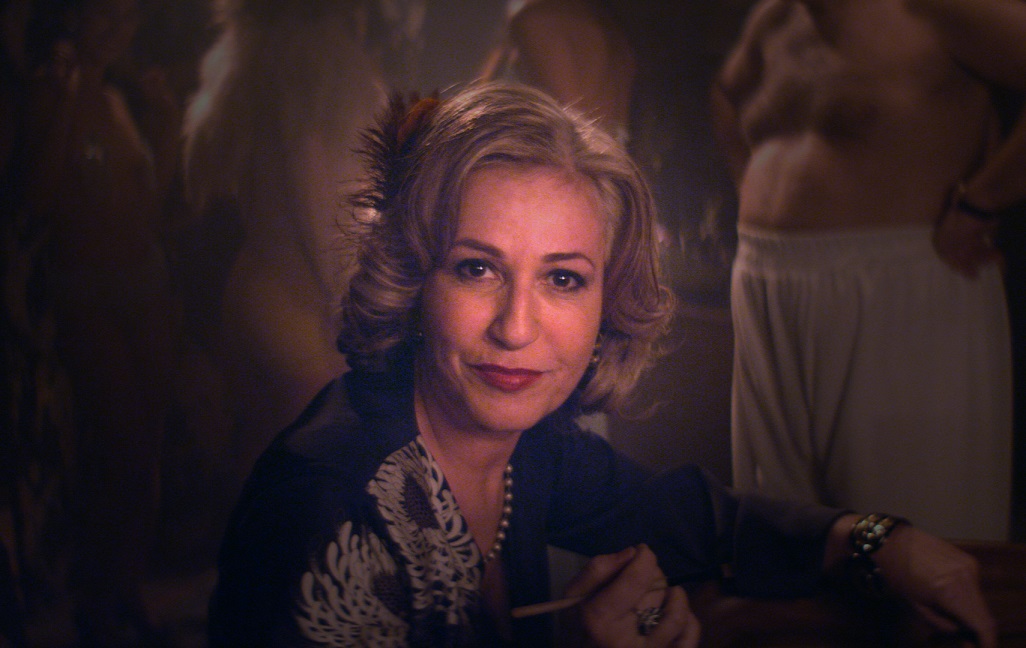 In a nicely satirical scene, Neruda finds that his connections within the old Chilean aristocracy (which still really runs the country) are of no avail, while his attempt to flee abroad is halted at the border. At which point the film's “wild hunt” sets in. With the poet on the run, his pursuer becomes police inspector Oscar Peluchonneau (Gael García Bernal, playing with nicely stylised verve), whom we have already encountered in voiceover. The communists may have initially debated whether the poet might be more valuable as a prisoner – we get a glimpse of what his fate in captivity would have been in a desert detention camp under the command of Augusto Pinochet, the nation’s future dictator – but now Party minders will be hurrying him and Delia from one safe house to another. Such furtiveness is alien to Neruda, who can’t resist reappearing at his old haunts, albeit often in disguise.
In a nicely satirical scene, Neruda finds that his connections within the old Chilean aristocracy (which still really runs the country) are of no avail, while his attempt to flee abroad is halted at the border. At which point the film's “wild hunt” sets in. With the poet on the run, his pursuer becomes police inspector Oscar Peluchonneau (Gael García Bernal, playing with nicely stylised verve), whom we have already encountered in voiceover. The communists may have initially debated whether the poet might be more valuable as a prisoner – we get a glimpse of what his fate in captivity would have been in a desert detention camp under the command of Augusto Pinochet, the nation’s future dictator – but now Party minders will be hurrying him and Delia from one safe house to another. Such furtiveness is alien to Neruda, who can’t resist reappearing at his old haunts, albeit often in disguise.
The trimly moustached Peluchonneau (pictured below) is a creature of fiction in every sense. In his own version he’s the illegitimate son of the founder of the Chilean police force and a prostitute, but actually his identity seems to develop as a product of Neruda's fantasy. The poet certainly seems to be in command of the pursuit, leaving a series of cheap detective stories – one of the writer’s fascinations – behind at each step of the chase (Larrain adds rear projections in Peluchonneau's car scenes, highlighting the detectve tropes). The ultimate indignity he feels is the suspicion that without his target he himself is literally nothing: Neruda may refer to him as “my phantom in uniform”, but it is clear that he is the one writing the script. This symbiotic relationship – “I dream of him, he dreams of me” – works in one direction.
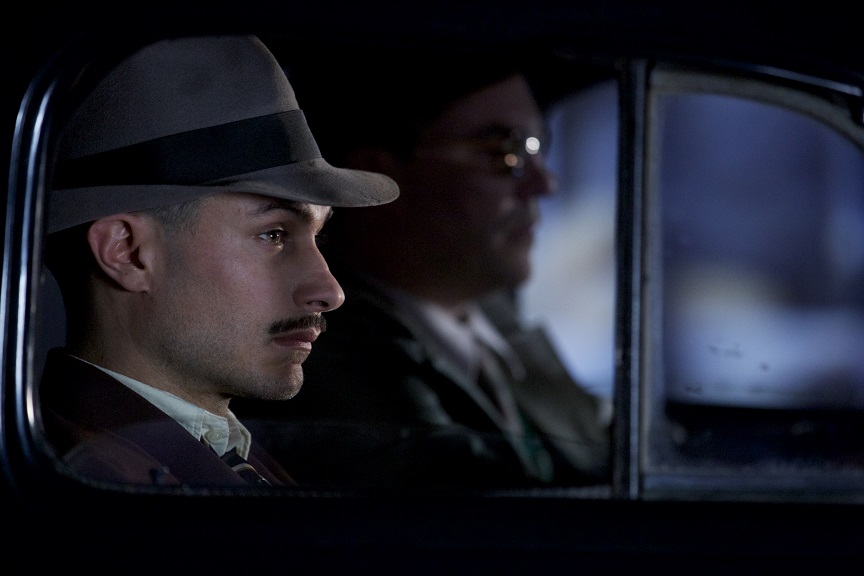 There is rich comedy in the process, as at each stage the hapless Peluchonneau arrives too late, or is defeated by disguises (there's a very funny scene set in a transvestite brothel). His interception of Neruda’s first wife Maria, and attempts to involve her in the process, are brought to a hilariously bathetic conclusion, while his encounter with Delia, no longer following her husband in his escape, provides one of the film's most telling scenes.
There is rich comedy in the process, as at each stage the hapless Peluchonneau arrives too late, or is defeated by disguises (there's a very funny scene set in a transvestite brothel). His interception of Neruda’s first wife Maria, and attempts to involve her in the process, are brought to a hilariously bathetic conclusion, while his encounter with Delia, no longer following her husband in his escape, provides one of the film's most telling scenes.
The pursuit becomes increasingly frantic, culminating in a dramatic ascent into the snows of the Andean mountains. Those last scenes are beautifully filmed by Larraine’s long-term cinematographer Sergio Armstrong, who also catches the darker period cityscapes of Santiago and the bright colours of Neruda’s festivities – both imagined and not, they have a visual flare that Fellini would surely have relished – with distinction. Federico Jusid contributes a grandiose musical score that feels like a presence in its own right.
“I chased the eagle, but I didn’t know how to fly,” Peluchonneau admits poignantly towards the end. We know from history that Neruda will escape, and flourish in emigration: his pursuer faces the cold end of irrelevance. It's a wry conclusion to a wry film, one which in its playful self-referencing sometimes recalls the work of Peter Greenaway. Larrain may not have set out to "catch" his subject in any predictable way, but his film is certainly imbued with the poet's spirit.
Overleaf: watch the trailer for Neruda


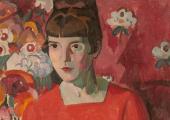
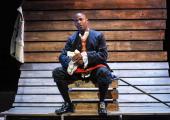
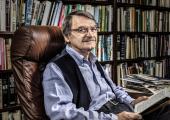
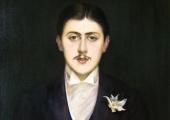

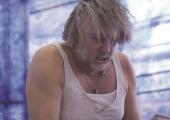
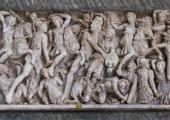
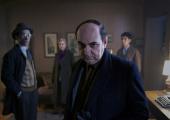
 In a nicely satirical scene, Neruda finds that his connections within the old Chilean aristocracy (which still really runs the country) are of no avail, while his attempt to flee abroad is halted at the border. At which point the film's “wild hunt” sets in. With the poet on the run, his pursuer becomes
In a nicely satirical scene, Neruda finds that his connections within the old Chilean aristocracy (which still really runs the country) are of no avail, while his attempt to flee abroad is halted at the border. At which point the film's “wild hunt” sets in. With the poet on the run, his pursuer becomes  There is rich comedy in the process, as at each stage the hapless Peluchonneau arrives too late, or is defeated by disguises (there's a very funny scene set in a transvestite brothel). His interception of Neruda’s first wife Maria, and attempts to involve her in the process, are brought to a hilariously bathetic conclusion, while his encounter with Delia, no longer following her husband in his escape, provides one of the film's most telling scenes.
There is rich comedy in the process, as at each stage the hapless Peluchonneau arrives too late, or is defeated by disguises (there's a very funny scene set in a transvestite brothel). His interception of Neruda’s first wife Maria, and attempts to involve her in the process, are brought to a hilariously bathetic conclusion, while his encounter with Delia, no longer following her husband in his escape, provides one of the film's most telling scenes.